Background
INTRODUCTION
In the mid-1990’s, the U.S. immigration enforcement strategy known as Prevention through Deterrence [PTD] was implemented along the southern border. This strategy increased security in unauthorized crossing areas surrounding urban ports of entry in an attempt to shift undocumented migration towards remote border regions such as the Sonoran Desert of Arizona, where security is less intense but crossing conditions (e.g., terrain) are more difficult. Two decades of research has shown that PTD has failed to deter migration, but has succeeded in shaping border crossing into a well-organized and violent social process with a unique set of material culture and technologies.
Started in 2009, the Undocumented Migration Project [UMP] is a long-term anthropological analysis of clandestine border crossings between Latin American and the United States directed by UCLA Anthropology Professor Jason De León. The UMP is a research-arts-education collective that seeks to both raise awareness about migration issues globally while also helping to reunite families with their loved ones who have gone missing crossing the US-Mexico border.
The UMP uses a combination of ethnographic, archaeological, forensic, and visual anthropological approaches to understand various aspects of unauthorized border crossings including the many forms of violence and suffering that characterize the process, the distinct experiences of migrant sub-populations (e.g., women, children, LGBT, non-Mexican nationals), and the evolving material culture associated with crossing.
By combining ethnographic work in Mexico with forensic and archaeological research in Arizona, Mexico, and Honduras, the UMP has improved our knowledge of this highly politicized and poorly understood process and demonstrated how an archaeological approach can provide new insight into a contemporary social phenomenon. The research being conducted by the UMP is interdisciplinary, a fact reflected by the project’s diverse theoretical and methodological approaches, the wide range of venues where this work is being published, and the ethnographic-archaeological field schools that have been running in Arizona and Mexico since 2010.
The evolution of migrant water bottles
